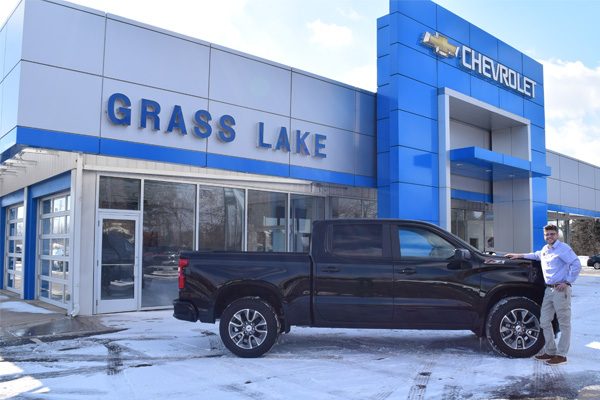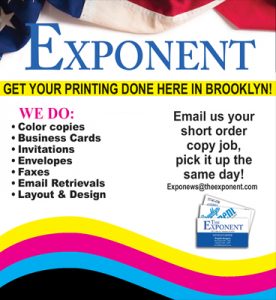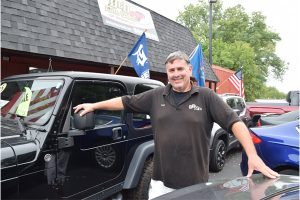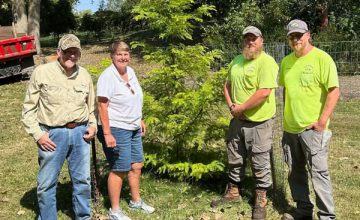Grass Lake Chevrolet Sales Consultant Drew DeFay models a new Chevrolet Silverado 1500 RST.
Story and photos
By John Hummer
Editor
There are many outfalls of the COVID-19 pandemic that have affected normalcy in our country, even down to the local level here in the Irish Hills area. One of those areas that Michiganders may never have dreamed of seeing here – in the global home of the automobile – is sometimes very sparsely populated car lots. If there are a fair number of cars, trucks, and sport utility vehicles in a bigger dealership’s lot, there are not nearly as many to choose from as there once were.
“It’s been a little bit of a roller-coaster – a dip to begin after COVID, then it kind of came back up,” said Irish Hills Ford General Manager Andrew Kunz. “Now we’re a little bit behind on what we have in the hopper for orders, but overall on a relatively even level.”
Kunz mentioned his low inventory, a bit up from just a couple of weeks ago, is largely due to the shortage of computer chips that run many electronic components of new vehicles, as well as other supply chain parts issues. “Used vehicles kind of goes hand-in-hand with new – not as many new to sell, which means not as many trade-ins, and auction prices are extremely high right now,” he said. “That’s not the best avenue to source vehicles right now.”
Kunz says rising interest rates on loans this year shouldn’t affect buyers too much. “There’s still demand,” he noted. “Maybe for those on the fringe of the market that will be a deciding factor, but I don’t think for those shopping it will be a big deterrent.”
Kunz says for new car buyers, it’s a good time to special-order vehicles because of extra rebate money being offered by Ford. For those seeking a pre-owned vehicle, he suggests, “The less specific someone can be in what they want, the better.” (more below)
Carl Arvidson of Extreme Dodge has worked for the dealership for 33 years and 40 years total for new car dealerships. He says that pre-COVID things were rolling great. “We were doing record year after record year,” he noted. After COVID hit, prices dropped and Arvidson started buying more. Then the shortage of chips hit the new car market. “That just drove the used cars’ values through the roof.”
Nonetheless, Arvidson says his dealership is still doing very well. “Smaller numbers, bigger profits. We’re getting charged more so we have to charge the consumer more. We’ve had cars in the past six to seven months that have had three price increases.”
The inventory at Extreme Dodge is in pretty good shape right now, all things considered. “One week I was able to buy 75 cars,” Arvidson said. In late February they had around 25 new and about 150 used on the lot. However, he noted that he typically has 350 to 450 used cars on the ground heading into March. February used car sales were down 50 cars from 2021.
The supply chain backlog also affects used cars available on the market due to the wait on parts. “Service-wise, or even me servicing my used cars, it’s taking me a lot longer to get them retail-ready,” he explained.
Arvidson says the rise in interest rates this year will affect buyers. “Everyone is payment conscious,” he noted. “The customer that comes in that wants a $300 to $350 payment is now $450 to $500 for the same car – the prices have gone up on the retail end of it.”
Arvidson says the rise in gas prices will also affect the market, noting that truck sales are always hit first. He also notes that for people who leased a vehicle, it’s a good time to buy their own lease out. “A lot of people have done that.” (more below)
Ray Tarelli is the general sales manager at Grass Lake Chevrolet. Relatively new to Michigan, he came on board with the Art Moehn Auto Group about a year ago. “[COVID] has definitely impacted the industry without a doubt,” he says. “The whole process is different now. It’s like a different business. Who would have thought that this is where we would be?
Tarelli said their inventory is pretty limited for both new and preowned vehicles. “Our new car inventory is much less than what we’d like to see,” adding that factories have new cars ready to ship. “They can’t make them fast enough because people want them – the new Trail Blazers are a real hot item,” he said. “We can’t hold onto them. We have a waiting list and work down the list as we get the vehicles in. We want to get everybody a vehicle that wants one.” Tarelli said in his 30 years in car sales, he’s never had to develop a waiting list before.
“[The factories] are trying to get them out – it’s now becoming an issue of them being able to move the vehicles out to the dealerships,” he noted. “They’re having logistics issues getting everything transported.” As of the end of February, the dealership had nine new vehicles on the lot. Tarelli says there is no concrete timeframe as to when the vehicle business will return to normal. “This could go on for a couple more years – we don’t know.” (more below)
Like other dealerships, there is a shortage of used vehicles at Grass Lake Chevrolet as well. “Used vehicles are bringing more [money in] than they ever have,” noted Tarelli. “I’ve had many instances where we’ve paid just as much, if not more, for a trade-in than [the vehicle owner] may have paid for it initially when they bought it two or three years ago. They’re worth more now – some of them – than when they were new. It’s unbelievable – I get blown away by it. I think most people are surprised at the value they’re able to get on their vehicle.”
Tarelli says a potential increase in interest rates this year could affect the market to some extent. “For some people that have to take a loan out to buy a car, it’s going to push that payment just out of their budget or a little bit out of reach,” he said. “Of course, we’re going to try to do everything we can to help everything work so we can still sell cars and people can still afford them. Because we can’t control that, all we can do is try to work with it and adjust.”
Tarelli has some basic advice for people in the vehicle market. “Know what you’re looking for and know what your needs and wants are. Have good communication with the dealer and be patient with the dealer because we’re struggling through this just like anybody else is. Find a dealer that you’re comfortable with and you feel is treating you fairly and let them do their job and find that vehicle for you. We’re going to work really hard to do that.”
Used car market ‘on fire’
Dean Gassert, the owner of D&D Auto Sales in Onsted specializes in preowned vehicles, said that sales pre-COVID were steady. “But since June of 2020, it’s just been on fire,” he said of the recent market trend. “I expected the [vehicle] market to drop, but I haven’t seen it as of yet. It’s a supply and demand thing. Who would’ve ever thought the car market would go as high as it did, especially the first 12 months after June of 2020?”
Gassert explained the dynamics of a car auction where dealers are vying for the same cars to buy for which they can then re-sell. “Eight guys are fighting for the same car. If they’re nice, clean units – pick-up trucks, diesel trucks – they’re all at a premium.” Then, if a dealer happens to be the winning bidder, it’s at a cost of 20 to 35 percent higher than in a normal market, he noted. He hasn’t been physically to the auction, however, since March of 2020, right before COVID. He has been visiting the auctions online.
“A car is only as good as the person you buy it from. I’ll stick to that forever – that’s how I’ve stayed in business for so long.” Dean Gassert, owner, D&D Auto Sales
Although D&D still has a substantial number of vehicles in their Onsted lot, it is only half full. Toward the end of February, Gassert had 58 vehicles in his lot compared to 118 in June of 2020 three months into COVID. “I’ve been very cautious in what I buy – picking and choosing. I’m not going to get in bidding wars with these guys,” he says.
Gassert noted that waiting for parts, thanks to the supply chain backlog, can delay getting a vehicle market-ready. “We needed a seat belt buckle for a Honda – it took us three weeks to get that,” he stated. “It just takes forever to get anything done.” He did say, however, that things are starting to get better compared to the first year after COVID hit. And that bodes well for more improving used car sales.
“With the [high] new car prices, I think that’s going to keep the used car market up,” Gassert noted. “Being in the car business for 27 years, I’m just shaking my head.”
Gassert’s one piece of advice to car buyers? “Deal with somebody you know,” he says. “A car is only as good as the person you buy it from. I’ll stick to that forever – that’s how I’ve stayed in business for so long. If you take pride in what you do, you’ll have customers coming back.”
One other piece of advice Gassert offers: “Be cautious of what you buy and don’t buy what you can’t afford. No car dealer will tell you that. I tell people that. I won’t set them up to fail.” (more below)
And then there are rising interest rates . . .
Last Wednesday, March 16, the Federal Reserve approved its first interest rate increase in more than three years, an effort to address spiraling inflation without stifling economic growth. The Federal Reserve approved a 0.25 percentage point rate hike, the first increase since December 2018. Officials indicated an aggressive path ahead, with rate rises coming at each of the Fed’s remaining six meetings in 2022.
Dr. Kevin McCormack, supply chain management professor for Northwood University in Midland and president of DRK Research, is encouraging those who need to make a large purchase over the next year to ‘buy now.’ “Everything will cost more in the future due to inflation: materials, service, and credit. If you can buy now, borrow now, do it now – it will cost less than later in the year.”
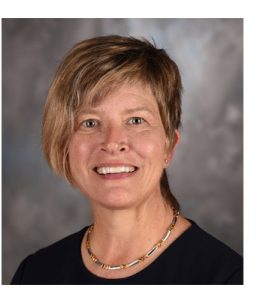 President/CEO of American 1 Credit Union Martha Fuerstenau, pictured left, says she tries not to do a lot of predicting when it comes to interest rates. “It seems the world has changed in a way that it’s hard to predict. Certainly, we’re going to see interest rates increase this year,” she noted. “I have no idea if we’re going to see it raised six times. I think it depends on what happens with inflation once they gradually start to raise rates.
President/CEO of American 1 Credit Union Martha Fuerstenau, pictured left, says she tries not to do a lot of predicting when it comes to interest rates. “It seems the world has changed in a way that it’s hard to predict. Certainly, we’re going to see interest rates increase this year,” she noted. “I have no idea if we’re going to see it raised six times. I think it depends on what happens with inflation once they gradually start to raise rates.
Fuerstenau says American 1 Credit Union is very sensitive to the market and will price their loans accordingly. “We always want to be a low-cost alternative for our members in that used auto space,” she says. American 1 also welcomes new members, as 20 to 30 percent of their used car loans go to people joining the credit union for the first time.
Fuerstenau said that in 2021, American 1 Credit Union financed not only more dollars, but more auto loans than they did pre-COVID in 2019. “Our used car dealers did find vehicles that people wanted to purchase and finance,” she stated. “We had a very good year for used auto financing in 2021,” adding that the used car space is where American 1 does most of its vehicle financing.


